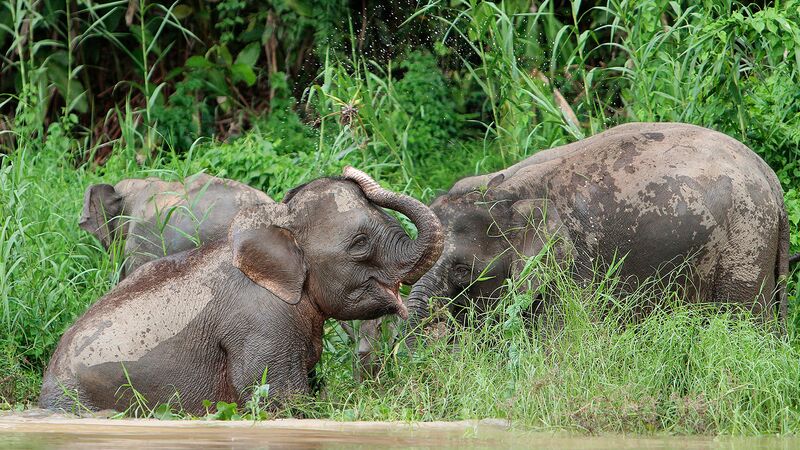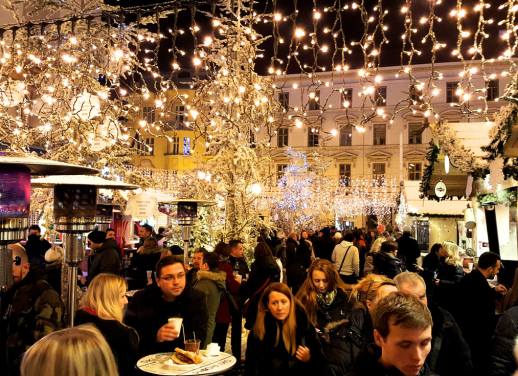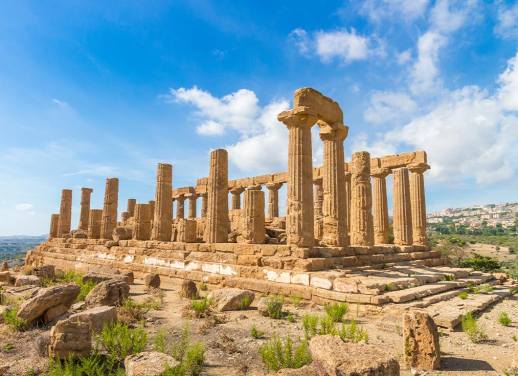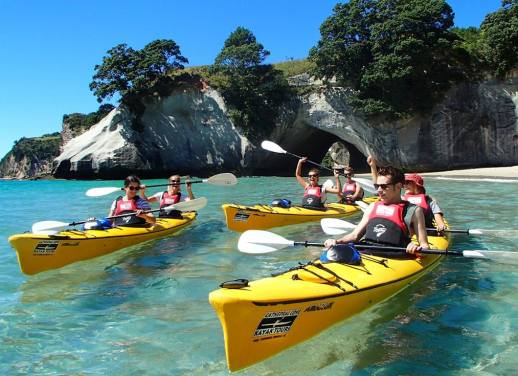‘It’s okay, it’s okay! I have a surprise for you.’
We’re zipping along the Kinabatangan River in a metal longtail boat. It’s 4 pm and the sun still has some sting to it, but it’s the perfect time for wildlife spotting in Borneo. The engine is loudly humming behind us but we’re all totally silent. The only voice we can hear is that of our wildlife river guide, Nelson.
Sitting at the back of the boat, I can see everyone leaning forward in anticipation, with their heads all angled in a slightly different direction and pointing outside to wildlife in the bushes. At the front of the boat, everyone has their eyes locked straight down the centre of the river, ready to see whatever appears on the other side of each river bend. In the middle of the boat, heads are turned outwards to the bank on the left and right side, binoculars at the ready.
Straight ahead, there’s more than 10 pygmy elephants along the riverbank, flapping their big ears and swinging their long tails while feeding on the river grass.
‘Relax, relax. Everything is under control. You’ll see,’ Nelson says.
I keep glancing over my left shoulder to see Nelson standing tall with his hand on the engine, trying to follow his gaze with mine as he steers us along the river’s edge. He’s totally relaxed, smiling and right at home on the Kinabatangan, a place he’s called home for over 30 years. He knows exactly what he’s looking for but meanwhile, I’m trying to read him for any clues – just a sneak peek of what’s coming.
‘AHHHAAA!’ he says, just as we fly around the river bend before abruptly stopping.
Straight ahead, there’s more than 10 pygmy elephants along the riverbank, flapping their big ears and swinging their long tails while feeding on the river grass. This is a moment I’ll never forget.
‘I know these ones well,’ Nelson laughs. ‘They always steal the bananas from my farm!’
Bornean elephants are at risk
According to WWF, it’s estimated that there’s fewer than 1500 Borneo pygmy elephants left in the wild. Habitat loss is one of their biggest threats. That’s where RESPonsible Elephant Conservation Trust (RESPECT), a partner of The Intrepid Foundation, comes into the picture.
I got together with a few friends and spoke to them about the idea, but at that time, planting food for any kind of wildlife, for any kind of conservation effort was quite unheard of.
At the end of my 11-day trip through Borneo on the Sabah Adventure, I had the chance to meet with Alexander Yee, chairman of RESPECT, to learn more about these incredible creatures – and why creating food sources is so important.
A baby elephant walked into a school canteen…
This isn’t the start of a bad joke. It’s the start of a great idea.
‘In 2018, I remember reading in the news about a baby elephant that went into a primary school and walked into the canteen,’ Alexander explains. ‘So that made me think, why did this elephant go to the school? He went in there looking for food.’
Like the herd we saw on the river – the same ones that steal Nelson’s bananas – Borneo’s pygmy elephants are all facing the same problem. Food shortages. Or worse, human-elephant conflict where elephants continue to make their way into nearby villages when searching for food due to habitat loss. Sadly, to protect the crops (and source of income) within these villages, small traps are set up to deter the elephants, and sometimes cause harm.
‘That gave me the idea of wanting to plant grass as a substitute for the diet of the elephants,’ Alexander continues. ‘I got together with a few friends and spoke to them about the idea, but at that time, planting food for any kind of wildlife, for any kind of conservation effort was quite unheard of.’
Many people were skeptical, but eventually, a trust was set up: RESPECT. The first project started by growing grass near the school – where the baby elephant was once spotted.
‘The site we chose was very barren and used to be a sawmill site,’ Alexander explains. Not only was the soil not fertile, but there was also a thick layer of timber offcuts that prevented the first batch of grass from growing.
‘So, the two years weren’t successful, but that gave us great insight on how to improve,’ he adds.


New food solutions in new places
Alexander was born in Kota Kinabalu, Sabah, and has owned and managed bed and breakfasts in the capital for years, and more recently, that extended to an eco-lodge near the Kinabatangan River.
‘I was wanting to move the grass planting site somewhere near me,’ he says. ‘I thought somewhere near Kinabatangan would be more suitable, as there was also research knowing there are some herds in Kinabatangan.’
Alexander found a site near the lodge in a fertile area and floodplain, making it perfectly suitable for planting napier grass, which is known to be a great source of nutrition and supplement an elephant’s natural diet.
While there are still elephants, let’s do our part. When we still have certain kinds of birds, certain types of sea creatures, certain animals, let’s do our part to protect them.
In May 2024, team members from the Intrepid office in Kota Kinabalu and The Intrepid Foundation participated in a ceremony at the lodge to break ground together and plant the napier grass. Since the first planting, the grass has grown five feet tall.
‘Now we’re just waiting for the elephants to come by now. Just today there is a sighting of a herd – if they come by, we want them to continue coming back to the site,’ Alexander explains.
‘What I look most forward too, is now that the grass has grown to a good size, I would like the herds in the area to find the grass,’ he says. ‘Elephants have such good memory and will remember where to find food, so the site we have cleared and planted will be known to them as a food source. I hope they stumble across it, and I know they’ll like it and come back.’
Caring for the places the wildlife call home
‘I think when you see any form of wildlife, for me, especially the elephants, if you see the young ones, the really small, cute ones, you’ll probably tend to wonder how best to make sure this little creature survives. That’s where the food source comes in,’ says Alexander.
To protect the places we visit on our travels, Alexander emphasizes that we need to ‘make sure it’s there for future generation.’ He goes on to add it’s everyone’s responsibility to conserve and protect the earth. ‘It’s not just the foundation or RESPECT, but every one of us plays a small and major role in making sure the place we’re living in is a better place.’
As our conversation wraps up, Alexander says, ‘while there are still elephants, let’s do our part. When we still have certain kinds of birds, certain types of sea creatures, certain animals, let’s do our part to protect them.’
Later that day I opened a WhatsApp message from Alexander with a video of elephants finding their way to the napier grass block. The swinging tails, flapping ears and leftover grass is a first step in the right direction. The elephants will (hopefully) never forget where to find this new food source, just as I’ll never forget my experience seeing wild elephants on the Kinabatangan River.
Learn more about the conservation being undertaken by RESPECT and how The Intrepid Foundation supports them. You can plant grass for pygmy elephants on the Borneo Family Holiday Comfort trip, one of our new and revamped family trips. Find out what else is new for 2025 with The Goods.




